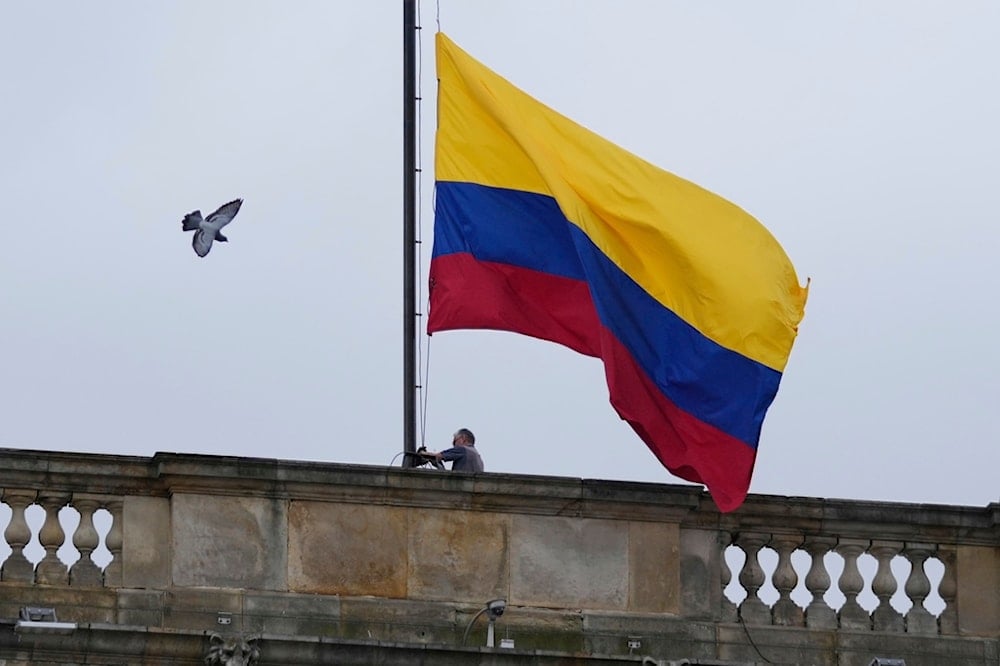Colombia halts intel sharing with US over deadly Caribbean strikes
Colombian President Gustavo Petro suspends intelligence cooperation with the United States over its deadly Caribbean boat strikes.
-

A worker raises the flag at Congress in Bogota, Colombia, Monday, August 11, 2025. (AP Photo/Fernando Vergara)
Colombian President Gustavo Petro has taken a decisive stand against US military operations in the Caribbean, ordering an immediate suspension of intelligence cooperation with Washington in response to the unlawful missile strikes on civilian vessels.
The Colombian leader announced the move on Tuesday, condemning the ongoing US attacks that have destroyed multiple boats and killed dozens. "All levels of public security intelligence have been ordered to suspend information sharing and other forms of interaction with US structures. This measure will remain in effect as long as missile attacks on boats in the Caribbean continue. The fight against drug trafficking must be subordinated to the human rights of the peoples of the Caribbean region," Petro declared on X.
Petro’s order comes amid growing global outrage over Washington’s campaign of naval strikes, which the US claims target drug-trafficking operations but which observers say increasingly resemble extrajudicial executions at sea. The United Kingdom has reportedly followed suit by freezing intelligence exchanges with the US, citing fears that the operations breach international law.
Se da orden a todos los niveles de la inteligencia de la fuerza pública suspender envío de comunicaciones y otros tratos con agencias de seguridad estadounidenses. Tal medida se mantendrá mientras se mantenga el ataque con misiles a lanchas en el Caribe. La lucha contra las… https://t.co/IZRWiL4s6t
— Gustavo Petro (@petrogustavo) November 11, 2025
Just a day earlier, the US carried out missile strikes on two vessels in the Eastern Pacific, killing six people in what officials described as an anti-narcotics operation, but which regional leaders have condemned as an unlawful act of aggression.
Maritime killings
In recent months, the Pentagon has stepped up its military footprint across the Caribbean under the guise of "counter-narcotics" and "counter-terrorism." Since September, President Donald Trump has authorized a series of missile attacks on vessels in the Caribbean and Eastern Pacific. The operations have destroyed around 20 boats and killed at least 75 people as of November 10.
UN High Commissioner for Human Rights Volker Turk condemned the strikes as "unacceptable," warning that they show "strong indications" of extrajudicial killings. He called for an independent investigation and demanded that Washington halt the attacks.
Within the US, several Democratic lawmakers have also broken ranks, denouncing the strikes as illegal and urging the Biden administration to release its legal justification. Senators Tim Kaine and Adam Schiff led a War Powers initiative to block further military action without congressional approval, while others accused the White House of undermining international law.
Caribbean unrest
As a result of US escalations, tensions have rippled across the region, with several island nations expressing alarm over the growing militarization of their surrounding waters.
Trinidad and Tobago has faced domestic unrest and diplomatic strain with Venezuela following the docking of US warships, while leaders in Barbados, Saint Vincent and the Grenadines, and Cuba have condemned Washington’s actions as reckless and destabilizing.
Even traditionally aligned states like The Bahamas and Jamaica are under pressure to reconsider their cooperation with US forces amid fears that the region is being drawn into a wider conflict that threatens its long-standing status as a zone of peace.
Read more: USS Gerald R. Ford redeployed to Caribbean amid US buildup

 3 Min Read
3 Min Read








